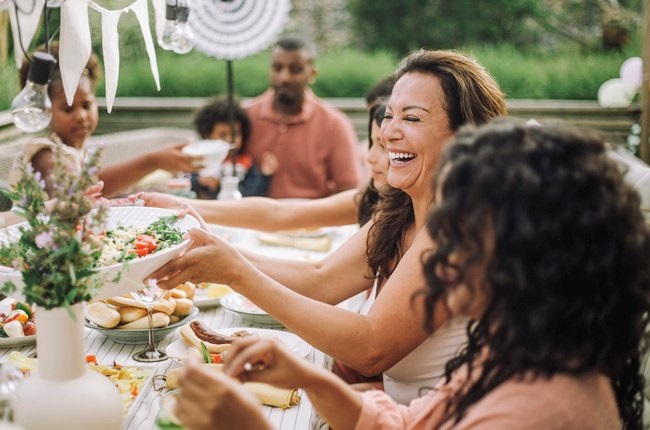
- With the warmer weather here, you may be looking forward to hosting a summer get-together.
- However, when you're cooking for large groups in hot weather, there's a small risk of food poisoning.
- To ensure your family and friends are safe, there are a few simple food prep rules you can follow.
The party season is something we associate with hot weather, celebrations and lots of food. But when you're cooking for larger groups in hot weather, there's a small risk of food poisoning - and it's not always as simple as an upset stomach for an hour or two.
"There may be vulnerable people in the group - the very elderly, pregnant women and very small children - who can be particularly susceptible to foodborne illnesses," says health communicator Lorraine Haase.
Food poisoning is caused by eating food contaminated with bacteria such as salmonella, E. coli, campylobacteriosis and Listeria, which can cause nausea, cramps, vomiting, fever, diarrhoea and headaches, with the risk of further complications in some cases.
To ensure your family is safe, follow these simple food prep rules.
Rule 1: Keep an eye on food
Food poisoning occurs when whatever you're eating becomes contaminated with bacteria, often due to changing temperatures. Says Lorraine:
The risk is usually associated with chilled food being out of the fridge for too long or leaving cooked food to reach room temperature before serving it.
It also pays to be temperature aware when you're taking treats to a friend's house. "If you're taking just-cooked hot food with you, then you need to use a special thermal bag, travel only within an hour and serve it fairly quickly," Lorraine says. "Otherwise, you need to bring less-risky dry foods and cakes."
Rule 2: Prepare your fridge for extra items
Another seasonal risk is that the warmer weather means your fridge has to work harder to stay cool, especially when it's packed full of extra food. "The more you have in your fridge, the harder it is to maintain a temperature of 5°C or less," Lorraine says.
Before you do the holiday shopping, Lorraine suggests buying a fridge thermometer and removing items that don't require constant refrigeration.
READ MORE | Load shedding: Why the energy efficiency of your fridge matters
"Drinks can be chilled in buckets or sinks with ice and water," she says. "Any sauces or things like pickles and chutneys that have a high amount of salt or vinegar will be fine in a cool cupboard for a day or two."
Rule 3: Be mindful when handling meat
"A big turkey takes a long time to defrost, so always use the fridge for defrosting or buy one already defrosted from your butcher," says Lorraine.
Once your bird is ready to be cooked, make sure it stays in the oven long enough to cook through completely. "All poultry, including chicken, is susceptible to salmonella and campylobacter unless it's cooked right through, so use a meat thermometer to make sure it's at least 75°C in the thickest part of the meat, such as breast and thigh."
Pork, beef and lamb can be safely cooked at lower temperatures. And use separate plates and cooking utensils for handling raw and cooked meat.
Rule 4: Take care with eggs
"Any dishes with eggs that aren't going to be cooked, like tiramisu, eggnog, chocolate mousse, mayonnaise or aioli, can become contaminated really easily," Lorraine warns.
The risk comes from using the eggshell to separate the yolks, which can lead to contamination with bacteria on the outside of the shell. It's fine to do this if the egg is cooked because bacteria will be killed through heating.
READ MORE | Are the eggs in your fridge safe to eat?
Rule 5: Keep seafood fresh
The freshest seafood is usually safest and is best consumed within a day of purchase. Even then, it's important to take care. Says Lorraine:
Take time to clean and rinse seafood well (remove the vein from prawns before serving and put out enough finger bowls).
Rule 6: Be salad savvy
Lorraine says fruit and veggies can be risky if not rinsed well. "Salad vegetables and cut fruit can be problematic, so prepare your salad and fruit salad on the day you're going to use it and refrigerate immediately."
It's also vital to wash fresh produce well, separating lettuce leaves, which may be contaminated with bacteria from soil or people handling them.
Source: aremediasyndication.com.au/magazinefeatures.co.za
